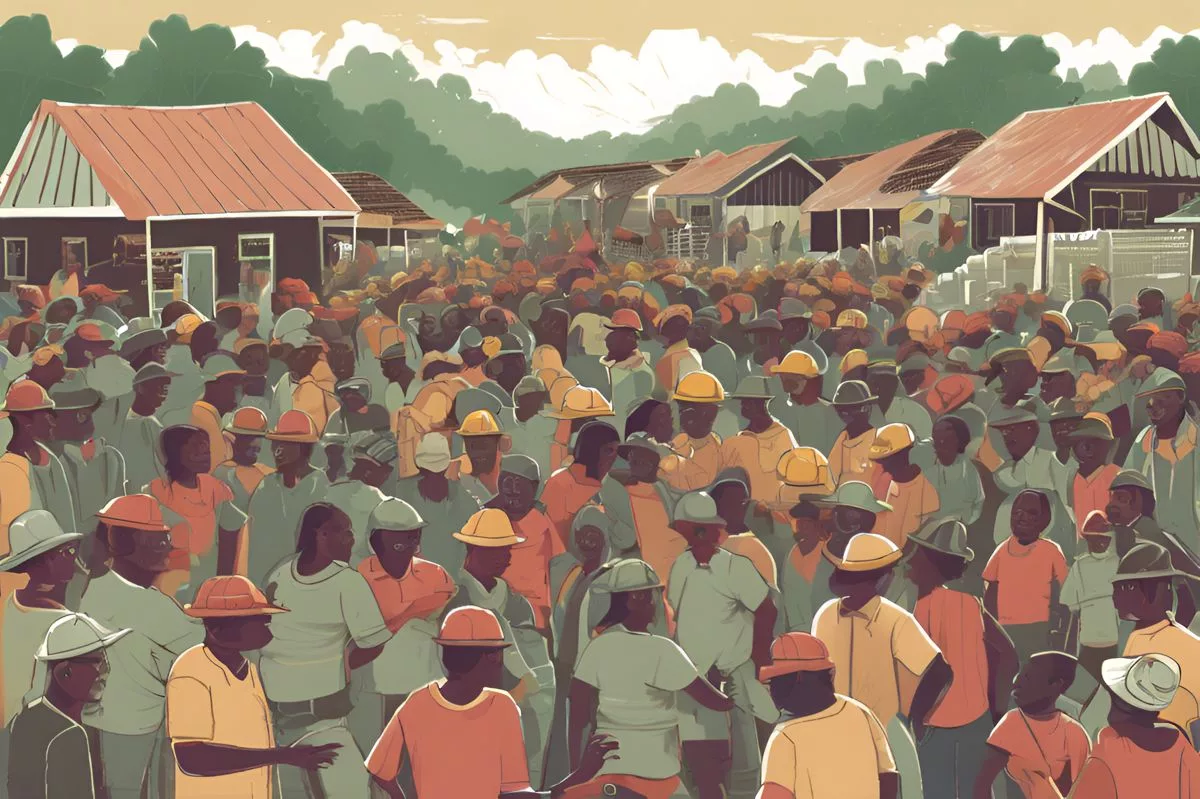The National Economic Development and Labour Council (NEDLAC) is praised for its transformative impact on South Africa’s socio-economic situation, addressing issues such as unemployment, economic disparity, and poverty through inclusive economic growth. The NEDLAC 30-year report highlights focus areas such as structural reforms, social security, and infrastructure development. Strengthening state capacity, particularly at the local government level, is identified as a crucial necessity for effective policy execution and service provision, while NEDLAC’s role as a symbol of collaboration and consensus-building grows increasingly critical in fostering sustainable economic progress and promoting social justice.
NEDLAC’s Contribution to Socio-Economic Development
The National Economic Development and Labour Council (NEDLAC) plays a central role in formulating policies that improve the socio-economic advancement of South Africa. The council’s influence is globally recognized as a model of transformative impact on the country’s socio-economic situation. NEDLAC addresses issues such as unemployment, economic disparity, and poverty through inclusive economic growth that generates employment. It also promotes dialogue, consensus-building, and mutual respect to manage climate change.
The 29th Annual Summit of the National Economic Development and Labour Council (NEDLAC) featured a passionate address from the Minister of Employment and Labour, Ms. Nomakhosazana Meth. She emphasized the significance of social dialogue and tripartite engagement in improving South Africa’s socio-economic condition. The summit brought together eager participants from various sectors, including government, labour, community, and business, playing a central role in crafting South Africa’s socio-economic policies and facilitating its advancement.
NEDLAC’s Contribution to Socio-Economic Development
In the opening address of the summit, Minister Meth stressed the importance of NEDLAC in South Africa’s socio-economic dialogue. She praised the Council for being instrumental in unifying different stakeholders to formulate policies propelling the economic and social advancement of the country. NEDLAC’s influence is well-regarded, not just nationally, but on a global scale, as an excellent model of its transformative impact on South Africa’s socio-economic situation.
Minister Meth underscored the significance of the Council in dealing with South Africa’s escalating issues like unemployment, economic disparity, and poverty. She insisted on the necessity for drastic inclusive economic growth that generates employment, given the rapidly changing international context. She pointed out data from the Quarterly Labour Force Survey disclosing that approximately 3.6 million out of 10.3 million youths aged between 15 to 24 years were neither employed nor receiving education or training (NEET). This situation demands a collective response from all social partners.
Addressing Climate Change and Unemployment
Minister Meth also made critical observations about the influence of climate change on employment, economic stability, and social welfare measures. She expressed satisfaction with the substantial progress made in managing climate change through the Presidential Climate Commission. She reiterated NEDLAC’s job in promoting dialogue, consensus-building, and mutual respect, which have been instrumental in South Africa’s development and will continue to be vital in its future economic and social expansion.
The summit marked the launch of the NEDLAC 30-year report, that showcases the successful outcomes of cooperative endeavors and shares valuable lessons. This report acts as a roadmap, indicating areas that require attention as South Africa forges ahead.
Focus on Structural Reforms and Social Security
The report highlights focus areas like structural reforms, social security, infrastructure development, and state capability. Minister Meth applauded the social partners’ dedication to collaborate with the government in implementing structural changes for economic efficacy and resolving deep-rooted disparities. She expressed that infrastructure development, with the backing of all social partners, will not only stimulate economic growth but also enhance service delivery and employment opportunities.
The government is determined to enhance and broaden the systems of grants, unemployment insurance and pensions as part of its commitment to social security. This commitment is especially crucial at a time when the country is facing challenges due to climate change and digital transformations that necessitate a comprehensive social security system.
Enhancing State Capacity and Looking Towards the Future
Strengthening state capacity, particularly at the local government level, is identified as a crucial necessity for effective policy execution and service provision. The Minister stressed that bolstering state capacity is not just a governmental task, but public service workers play a crucial role in promoting a responsive government.
The summit served as an occasion for reflection on common journeys and collective achievements, while also providing a platform to plan for the future with renewed focus on key priority areas. As South Africa navigates its socio-economic terrain, NEDLAC’s role as a symbol of collaboration and consensus-building grows increasingly critical in fostering sustainable economic progress, promoting equitable labour practices, and advancing social justice.
Despite the challenges, the future of South Africa holds promise. The collective strength of NEDLAC’s social partners, stakeholders, and the international and regional community continues to inspire optimism. Their steadfast support, devotion, and relentless efforts substantiate NEDLAC’s position as a symbol of collaborative governance, shaping South Africa’s socio-economic environment positively.
Anticipating the next 30 years, the nation can find comfort in being guided by an organization that values dialogue, consensus-building, and mutual respect. The aspiration is that these values will continue to propel progress, leading to a more inclusive, equitable, and prosperous South Africa for all.
What is NEDLAC’s role in South Africa’s socio-economic advancement?
NEDLAC plays a central role in formulating policies that improve the socio-economic advancement of South Africa. It addresses issues such as unemployment, economic disparity, and poverty through inclusive economic growth that generates employment. It also promotes dialogue, consensus-building, and mutual respect to manage climate change.
What was discussed at the 29th Annual Summit of NEDLAC?
The 29th Annual Summit of NEDLAC discussed the significance of social dialogue and tripartite engagement in improving South Africa’s socio-economic condition. It brought together eager participants from various sectors, including government, labour, community, and business, playing a central role in crafting South Africa’s socio-economic policies and facilitating its advancement.
What are the focus areas in the NEDLAC 30-year report?
The NEDLAC 30-year report highlights focus areas such as structural reforms, social security, infrastructure development, and state capability. The report acts as a roadmap, indicating areas that require attention as South Africa forges ahead.
What is the government’s commitment to social security?
The government is determined to enhance and broaden the systems of grants, unemployment insurance and pensions as part of its commitment to social security. This commitment is especially crucial at a time when the country is facing challenges due to climate change and digital transformations that necessitate a comprehensive social security system.
Why is strengthening state capacity crucial?
Strengthening state capacity, particularly at the local government level, is identified as a crucial necessity for effective policy execution and service provision. Bolstering state capacity is not just a governmental task, but public service workers play a crucial role in promoting a responsive government.
What is the future of South Africa with regards to NEDLAC’s role?
As South Africa navigates its socio-economic terrain, NEDLAC’s role as a symbol of collaboration and consensus-building grows increasingly critical in fostering sustainable economic progress, promoting equitable labour practices, and advancing social justice. The collective strength of NEDLAC’s social partners, stakeholders, and the international and regional community continues to inspire optimism for a more inclusive, equitable, and prosperous South Africa for all.












